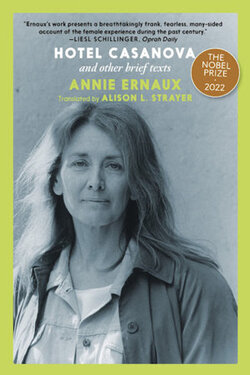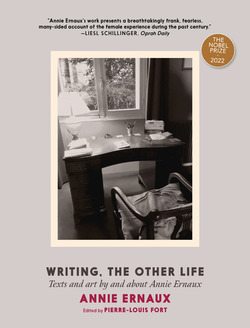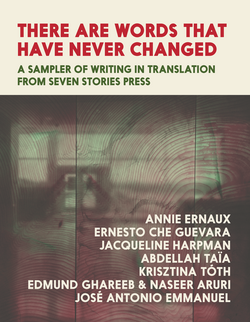Another thought-provoking master class in how we perform life by the award-winning novelist and playwright Yasmina Reza.
"I was bored with my husband," says Anne-Marie, the irrepressible voice of Anne-Marie The Beauty, "but you know, boredom is part of love." Mostly she is speaking here of her more famous friend and colleague, the French actress Giselle Fayolle, in whose shadow she has spent her career. "My life was a near miss," she adds, before explaining that she enunciated well because "I loved to say the words." A very short novel with the power and resonance of a much longer one, Anne-Marie The Beauty is a profound and moving act of remembrance, a clear-eyed assessment of the hard-edged nature of fame, a meditation on aging--and a wonderfully observant and comic exploration of human foibles. In short, another thought-provoking master class in how we perform life by the peerless Yasmina Reza.
Words expanded me: An excerpt from "Anne-Marie the Beauty" by Yasmina Reza, tr. Alison L. Strayer
An exclusive excerpt from Anne-Marie the Beauty by Yasmina Reza (tr. Alison L. Strayer)
~
Gigi received her lovers slathered in beauty masks and while shaving her legs. She made her own masks from vegetables, aubergines, carrots
She had no intellectual life whatsoever
If you ask me, she never read a whole play, not even the ones she acted in
For Bérénice, she only read her own scenes
The playbill was posted at the entrance to the theater. My name was at the bottom. I passed it sixty times a day. I walked up and down rue du Calvaire to test the effect of the name Anne-Marie Mille on people passing by. It was in small letters at the bottom, next to last, but you could see it clearly because of the double space just below. The name caught your eye. Especially on the downhill walk
Anne-Marie Mille had the ring of stardom
Who’s playing in Three Sisters? . . . Anne-Marie Mille. Anne-Marie Mille!
Who’s playing Angélique? . . . Anne-Marie Mille. Anne- Marie Mille, magnifique!
My life was a near miss, madame. In some of the photos from Saint-Sourd, I have the hands of a girl in a coma. Arms dangling, wrists curled, fingers pointing upward. I saw on TV that when a person in a coma curls his wrists, he’s a goner
We gave poetry recitations at the youth club hall of the church, and people said, Anne-Marie’s diction is excellent, Anne-Marie has perfect enunciation
I did enunciate well
I enunciated well because I loved to say the words, mademoiselle
Words expanded me
On weekends and holidays, they made me wear white gloves like American women
I did not know how to hold myself in the bulky oldlady dress and the hairstyle they’d given me
Parted down the middle
The natural wave flattened on top, with kisscurls at the sides. I already had breasts
She cut my hair all the time, all the time
My mother was a laundress at the Hôtel du Quai. She’d started as a worker in the lace mills. In the blank where you wrote your parents’ occupations, I had to write pattern maker
She killed herself two or three times a year
At thirteen, I made myself hairpieces from synthetic yarn to have the feel of bouncy locks on my cheeks
They were supposed to make me look pretty, mademoiselle
My mother said, we need to see her face, but my face was not right
They worked on straightening and styling the hair, but my face never followed
The stiff white dress with puffy shoulders
Diamond-patterned tights
I felt hideous, hideous
I can spot an unhappy girl in her Sunday best from ten miles away
When an actor from Saint-Sourd passed, we stopped to look. Afterward the street seemed empty
They were tall and pale. They walked above the ground with graceful strides
We couldn’t hold a candle to them
The new generations will never witness this procession. Never, monsieur
It snowed last night. Real snow. The bus shelter is completely covered
My son told me, a woman your age took a migrant into her home and he knifed her
Right . . .
My son bought me a blood pressure monitor
I made the mistake of telling him the new doctor thinks my blood pressure’s high
Who wants that kind of thing around? I chucked it in the cupboard with the cane
He’s a worrier. A worrier like his father
Advice, advice, advice
He has a new tic. He clears his throat on the phone. He clears it every two sentences. I say, if you’re phoning just to clear your throat, don’t bother
When he comes to the house, I bring out the blood pressure cuff. I leave it lying around as if I used it. The sight of those medical gewgaws makes my skin crawl. They spell the end
He’s barely in the door when he says, it’s an oven in here! I say, I like it this way. —It’s eighty degrees! I can’t stay in this kind of heat. —Well, go, then! It’s my home and I’m fine. I have to grab him before he fiddles with the dials on the boiler. Why must you take control of everything against my will? —Someone has to keep an eye on you. You exhibit disturbing behavior. Wanting to be warm is a disturbing behavior?
That’s how it is with us, the world shrunk down to the strictest run-of-the-mill
If I ask about his life, he gets all worked up. We only talk about my woes, never anything of interest. He goes to the kitchen and lines up my boxes of prescriptions in a row so I don’t mix them up
I say, what’s the point? Your grandmother—my mother—had a plastic bag full of pills she nibbled at like Haribos. She just dug in, not knowing what she was taking
And look how she ended up
Dead, same as everyone else. Who has it any better in the end?
I almost forgot an important detail, madame: I started with cut-out pictures of Brigitte Bardot
My mother brought home old magazines from the hotel. She flipped through them at night, sipping a Gypsy Rose. She powdered herself like a corpse and went full tilt on the rouge. I never knew if it was due to bad lighting over the sink, or because she was a nutter
In the magazines, I always looked for photos of Brigitte Bardot. I clipped them out and pasted them in an album that I showed to invisible visitors
I narrated episodes from my life, turning the pages with modesty because of course this beauty was me. Anne-Marie the Beauty
I posed with thigh-high boots like Nancy Sinatra, and pulled funny faces on a boat in Norway
Sometimes I told my visitors, yes you’re right, I do look pensive sitting on that bench. It was a dark time of my life
But I didn’t talk about my beauty or my hair
Or I just said, yes, a French twist is the height of chic! I like to do my hair that way once in a while
Giselle never had hair like Brigitte Bardot’s. No!
I spoke loudly in a voice that was not mine. I was always afraid someone would hear or see me. Our room was a hallway. You could enter through two diagonal doors. We had a trundle bed. My sister slept on the lower shelf, which was never properly raised off the floor. For her entire childhood, she slept low to the ground. In the daytime, her bed disappeared. It ticked me off when she sat on mine. Sometimes I gave her a push. People would yell at me. They said, where do you expect the poor thing to sit? Poor thing! Always the poor thing
Anne-Marie the beauty did not have a bedroom with daisy-patterned walls. Anne-Marie the beauty was beautiful, her hair wasn’t parted down the middle, or set in an ugly perm, or flat as a pancake at the top of her head and puffed-out around the ears
She was an unknown, you know
~
Another thought-provoking master class in how we perform life by the award-winning novelist and playwright Yasmina Reza.
“Aging but indomitable actress Anne-Marie shares her reminiscences as she recuperates from knee surgery in her Paris apartment. She may be telling her story to someone, but exactly who remains a mystery. Perhaps she's speaking to a journalist writing a feature about her recently deceased long-time friend, French actress Giselle Fayolle. Anne-Marie recalls the pivotal events and people in her life, including the phantasmal and formative vision of watching actors as they seemed to walk above the street in her small town in northern France and about creating a photo album for an alter ego named Anne-Marie The Beauty. At 19, Anne-Marie goes to Paris, wins an audition, and is mesmerized by beautiful Giselle, who, at 21, is already destined to become astar, overshadowing Anne-Marie. Celebrated novelist and playwright Reza is interested in more than surface beauty in this tale of friendship, aging, and what gives life meaning. Anne-Marie, who still remembers the names of those hometown players from her youth, endures, sharing her view of life as a great arc in this brief yet richly symbolic, humorous, and poignant tale.”
—Mary Ellen Prindiville, Booklist
"Yasmina Reza, a French novelist and playwright, has centered much of her work on the buttoned-up crises of the middle class. Her most recent book, Anne-Marie the Beauty (in Alison L. Strayer’s translation), dips into the fickle glamour of life onstage. Anne-Marie is an aging, lonely actress who worries she might be losing her marbles. In a richly layered monologue, she looks back on her life, starting with her childhood dreams of the theater, which never resulted in more than middling fame — and the contrasting success of her luxuriant friend Giselle, who did reach the stars, despite, or perhaps thanks to, her fabulous languor. Reza, herself an erstwhile actor, has said that she realized early on that acting “was a life of waiting and dependence” that offered little control over one’s destiny, and Anne-Marie’s life is a testament to this peripatetic existence. “What’s a person looking for, going from bar to bar like that?,” Anne-Marie asks as she recalls her youth. This novel reminds us that dreams are sometimes more precious than the real thing."
—Kira Josefsson, Vulture

















